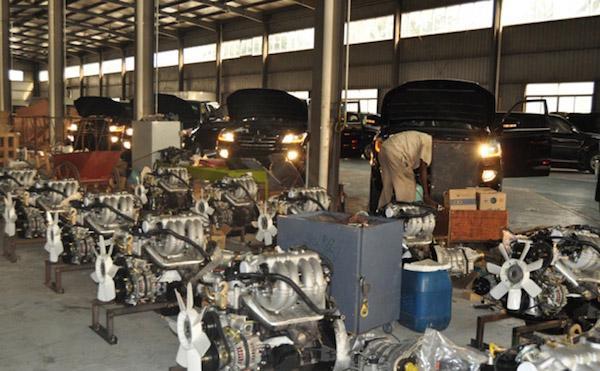When President Bola Tinubu assumed office on May 29, 2023, he pledged to remodel Nigeria’s economy for growth and development.
He outlined eight priority areas to raise the nation’s Gross Domestic Product (GDP) to one trillion dollars by 2030.
A common thread runs through these priorities, with each depending on a strong steel industry.
For key sectors such as construction, transport, energy, agriculture, manufacturing, defence, telecommunications and household goods, steel forms the backbone.
It is indispensable to modern life and central to Nigeria’s ambition of building a diversified economy less dependent on oil.
Recent statistics reflect the urgency of this goal.
The National Bureau of Statistics (NBS) revealed that the non-oil sector contributed 96.03 per cent to Nigeria’s GDP in the first quarter of 2025, a 0.05 per cent increase compared to the same period in 2024.
Analysts argue that a reliable local steel industry could provide the foundation for sustaining this growth.
They add that it would also reduce dependence on imported steel products, which drain over four billion dollars from Nigeria’s foreign exchange annually.
Although successive administrations have recognised the crucial role of steel, Nigeria has struggled to translate this recognition into reality.
A major turning point came in 1979, when President Shehu Shagari established the Ajaokuta Steel Company Ltd. (ASCL).
Conceived as an integrated complex of about 43 units, it was envisioned as the engine of Nigeria’s industrialisation.
More than four decades later, however, the project remains largely comatose in spite huge investments.
Stakeholders say the company faces financial and operational challenges that threaten its survival.
Steel products exhibited at the National Steel Summit.
At the first National Steel Summit in August, Prof. Linus Asuquo, Director-General of the National Metallurgical Development Centre (NMDC), listed Ajaokuta’s setbacks as “huge financial burdens, mismanagement, corruption and a disconnected value chain infrastructure”.
According to him, Nigeria has invested over eight billion dollars in the project, but mismanagement and policy failures have stalled progress.
The supply chain remains weak, with the National Iron Ore Mining Company (NIOMCO) in Itakpe, created to feed Ajaokuta, still non-operational.
In addition, inland rolling mills in Jos, Katsina, Oshogbo and Delta; intended to process billets from ASCL into finished products have remained underperforming or dormant due to shortages and poor maintenance.
This situation is especially worrisome because, albeit abundant raw materials such as iron ore, limestone and coal, Nigeria imports more than 90 per cent of its steel needs.
The paradox of a resource-rich country still dependent on imports underscores the urgency of reform.
The Ministry of Steel Development, led by Minister Shuaibu Abubakar, explained that the absence of operational integrated steel plants had hampered Nigeria’s industrial development potential.
It was against this backdrop that the ministry convened the National Steel Summit from Aug. 13 to Aug. 14 to promote partnerships, knowledge exchange and inclusive dialogue for a sustainable roadmap.
The summit, themed: “Rebuilding and Consolidating Nigeria’s Steel Industry: Collaborative Action for Sustainable Growth and Global Competitiveness”, drew policymakers, industry operators, financiers, academia and energy experts.
Some steel raw materials exhibited at the first National Steel Summit in August
Deliberations, participants noted, were centred on revitalising the sector to drive industrial growth and enhance Nigeria’s global competitiveness.
In his presentation, “Unlocking the Full Potential of Nigeria’s Legacy Steel Assets: Pathways to Sustainable Revitalisation and Industrial Growth,” Asuquo made several recommendations.
He proposed a combination of modern mini-mill technologies, private sector concessions, phased revival, remanufacturing, and Environmental and Social Impact Assessments (ESIA).
He also called for industrial parks, free trade zones, increased funding for NIOMCO, stronger value-chain linkages, investment in human capital and effective policy reforms.
The summit communique outlined short-term steps such as restarting idle units at Ajaokuta using imported billets to stimulate the market, reinstating NIOMCO operations, and intensifying coking coal exploration.
In the medium term, it recommended revitalising Ajaokuta through public-private partnerships or Build–Operate–Transfer (BOT) models, modernising legacy plants with energy-efficient technologies, and strengthening energy and transport infrastructure.
The communique further proposed dedicated industrial corridors with secure rail, port and road access, as well as vocational training in metallurgy, welding and fabrication.
To drive demand, it suggested local content quotas for government infrastructure projects and expansion of industrial clusters across geopolitical zones.
These measures, stakeholders observed, would not only boost production but also encourage job creation and innovation in related industries.
Summit participants agreed that steel must be treated as a strategic national asset if Nigeria is to achieve its trillion-dollar economy target.
Tinubu, represented by Vice President Kashim Shettima, reiterated government’s ambition of producing 10 million tonnes of liquid steel by 2030 and generating over 500,000 jobs in the industry.
“This administration has laid a robust foundation for the revitalisation of Nigeria’s steel industry through strategic policy decisions, substantial investments, international collaborations and intensifies efforts to foster private sector participation in driving economic growth.”
According to him, the plans include a 10-year roadmap for the revival of the steel sector and a three-year plan for operationalising Ajaokuta Steel Plant, covering infrastructure, regulatory reforms and capacity building.
Tinubu outlined the steel agenda as a ‘national mission’ requiring private sector investment, university innovation and the support of workers and the public.
While stakeholders welcomed the political will, they emphasised the need for policy consistency, institutional reforms, stable energy, logistics and sustainable financing to reposition the sector.
They noted that with disciplined governance, unity of purpose and systematic implementation, Nigeria’s steel industry could finally fulfil its potential as the engine of the nation’s trillion-dollar economy.NAN





